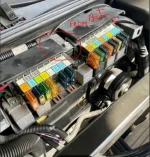Lonestar
New member
- Joined
- Sep 30, 2025
- Messages
- 8
- Reaction score
- 0
- Points
- 1
- Buick Ownership
- 1994 Park Avenue
Working on my grandson's car. Replaced the heater bypass nipple that had cracked off.
Got it all back together. Went to start it and the battery was dead. It wasn't fully charged from previous incident. Got the charging cables, which I had to hold in place on one of his terminals because the jaws are misaligned.
He attempted to start it and the alternator just jiggled like it was crazy. (I thought that it was because of low power.) He tried for about 5 seconds three times, then it make a pop/clink sound and bit of smoke comes up from mid engine area, it seems. (?)
I'm 71 and have have NEVER hooked up cables wrong but I'm pretty sure that's what happened. I didn't even consider it until after I had left and gone home. Should we charge battery and attempt to start again or do some troubleshooting first? Any suggestions on where I should start. I'm devastated! He just got this car with only 47K miles a few weeks ago and has been having to wait to get the other issue resolved. I'm devastated.
Appreciate any help...
Got it all back together. Went to start it and the battery was dead. It wasn't fully charged from previous incident. Got the charging cables, which I had to hold in place on one of his terminals because the jaws are misaligned.
He attempted to start it and the alternator just jiggled like it was crazy. (I thought that it was because of low power.) He tried for about 5 seconds three times, then it make a pop/clink sound and bit of smoke comes up from mid engine area, it seems. (?)
I'm 71 and have have NEVER hooked up cables wrong but I'm pretty sure that's what happened. I didn't even consider it until after I had left and gone home. Should we charge battery and attempt to start again or do some troubleshooting first? Any suggestions on where I should start. I'm devastated! He just got this car with only 47K miles a few weeks ago and has been having to wait to get the other issue resolved. I'm devastated.
Appreciate any help...




